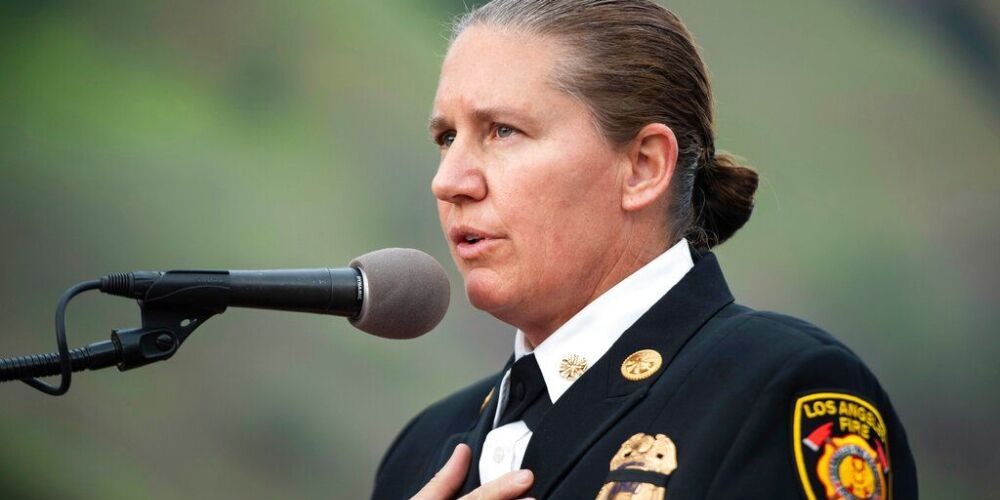The city of Los Angeles is grappling with mounting criticism over its handling of the fire department and an ongoing crisis that has resulted in devastating losses. At the center of this controversy is Fire Chief Kristin Crowley, who has publicly pointed fingers at city leadership for failing to provide the resources her department needs.
But is this solely a case of city officials letting down their fire department? Or does the accountability extend deeper across all levels of government? Let’s break down the challenges, failures, and what this means for Los Angeles—and beyond.
The Ripple Effect of Government Failure
When a city as massive as Los Angeles experiences operational failures, the consequences are rarely isolated. This isn’t just a challenge for LA residents or even Californians. The financial, logistical, and economic impacts spread across the nation.
Home to over 4 million people, Los Angeles is the second-most populous city in the United States. A city-wide failure at this scale inevitably affects federal resources, insurance markets, and supply chains. Whether you’re in Miami, Seattle, or any other corner of the country, chances are you’ll feel the impact—if not directly, then through rising insurance rates or disrupted goods and services.
Budget Cuts and Leadership Decisions
Mayor Karen Bass has come under scrutiny for budgetary decisions that many argue have left the fire department inadequately prepared. Reports indicate that $17.6 million was cut from the fire department’s budget to fund programs aiding undocumented immigrants and other city initiatives. This is on top of an additional proposed $49 million reduction, which fortunately didn’t pass.
These funding decisions come at a steep cost. Firefighters are left without proper resources to combat surging emergencies, including the very wildfires wreaking havoc today. It’s a sobering reminder of how prioritizing certain initiatives over critical infrastructure can leave communities vulnerable.
A County and State in Crisis
Failures don’t stop at the city level. Los Angeles County has struggled to coordinate emergency alerts effectively, with reports of evacuation notices being misdirected to millions of unintended recipients. One glaring example saw Orange County residents panicking after receiving evacuation notices for fires nowhere near them. This disorganized response eroded trust in emergency systems and created unnecessary chaos.
At the state level, California’s government—overseeing what would be the fifth-largest economy in the world if it were an independent nation—seems equally constrained. Years of systemic inefficiency, bloated bureaucracy, and questionable priorities have left a state rich in resources struggling to meet its most basic responsibilities.
For many residents, California’s leadership doesn’t inspire confidence. It’s not just incompetence—it’s a consistent cycle of mismanagement that puts lives at risk.
Kristin Crowley’s Role and Accountability
Fire Chief Kristin Crowley has not been shy about criticizing city leadership. In interviews, she’s repeatedly stated that her department isn’t getting what it needs to meet the community’s demands. However, this raises an important question: Why didn’t she sound the alarm sooner?
- Preserve your retirement with physical precious metals. Receive your free gold guide from Genesis Precious Metals to learn how.
Crowley’s focus on promoting diversity, equity, and inclusion (DEI) initiatives underscored much of her tenure. While breaking barriers as the first openly LGBTQ+ woman to lead the department is a historic achievement, critics argue that her focus was misplaced when pressing resource shortages posed a looming threat.
If Crowley knew the department lacked the resources to deal with significant fires, she had a duty to sound the alarm much earlier. Instead, her energies seemed directed toward personal and symbolic achievements rather than advocating for critical funding. Whether this was due to poor judgment, incompetence, or political caution, it underscores a leadership gap at a crucial time.
Political Agendas vs. Public Safety
One of the most troubling aspects of this crisis is how political agendas appear to have taken priority over public safety concerns. Leaders like Mayor Karen Bass and others at different levels of government seemingly focused more on progressive programs than on ensuring preparedness for emergencies of this scale.
The result? A fire chief under-resourced, firefighters stretching themselves thin, and a population caught in the crossfire—literally. As the death toll rises, the consequences of poor governance become tragically clear.
What Comes Next?
The reality of this crisis goes beyond pointing fingers. It’s a wake-up call for Los Angeles and every city confronting resource shortages and emergency preparedness. Leaders must balance long-term initiatives with the immediate needs of essential services like public safety.
Without meaningful changes in leadership, priorities, and funding, this isn’t the last time Californians—or Americans as a whole—will bear the fallout of systemic incompetence.
Final Thoughts
Los Angeles’ current predicament is a glaring example of how bad policies breed dangerous outcomes. From city officials cutting critical budgets, to county mismanagement, to a state government riddled with inefficiency, every level of leadership shares the blame.
For Chief Kristin Crowley, the time to act decisively has long passed. Her acknowledgment of failure doesn’t absolve her of responsibility for knowing her department’s limitations and failing to raise the alarm months ago. Breaking glass ceilings is commendable, but leadership is about action—and Los Angeles residents shouldn’t have to pay the price for political miscalculations.
This crisis demands accountability, reform, and above all, a shift in priorities. Lives depend on it.
Video Summary generated with assistance of AI.
Controlling Protein Is One of the Globalists’ Primary Goals
Between the globalists, corporate interests, and our own government, the food supply is being targeted from multiple angles. It isn’t just silly regulations and misguided subsidies driving natural foods away. Bird flu, sabotaged food processing plants, mysterious deaths of entire cattle herds, arson attacks, and an incessant push to make climate change the primary consideration for all things are combining for a perfect storm to exacerbate the ongoing food crisis.
The primary target is protein. Specifically, they’re going after beef as the environmental boogeyman. They want us eating vegetable-based proteins, lab-grown meat, or even bugs instead of anything that walked the pastures of America. This is why we launched a long-term storage prepper beef company that provides high-quality food that’s shelf-stable for up to 25-years.
At Prepper All-Naturals, we believe Americans should be eating real food today and into the future regardless of what the powers-that-be demand of us. We will never use lab-grown beef. We will never allow our cattle to be injected with mRNA vaccines. We will never bow to the draconian diktats of the climate change cult.
Visit Prepper All-Naturals and use promo code “veterans25” to get 25% off plus free shipping on Ribeye, NY Strip, Tenderloin, and other high-quality cuts of beef. It’s cooked sous vide, then freeze dried and packaged with no other ingredients, just beef. Stock up for the long haul today.


